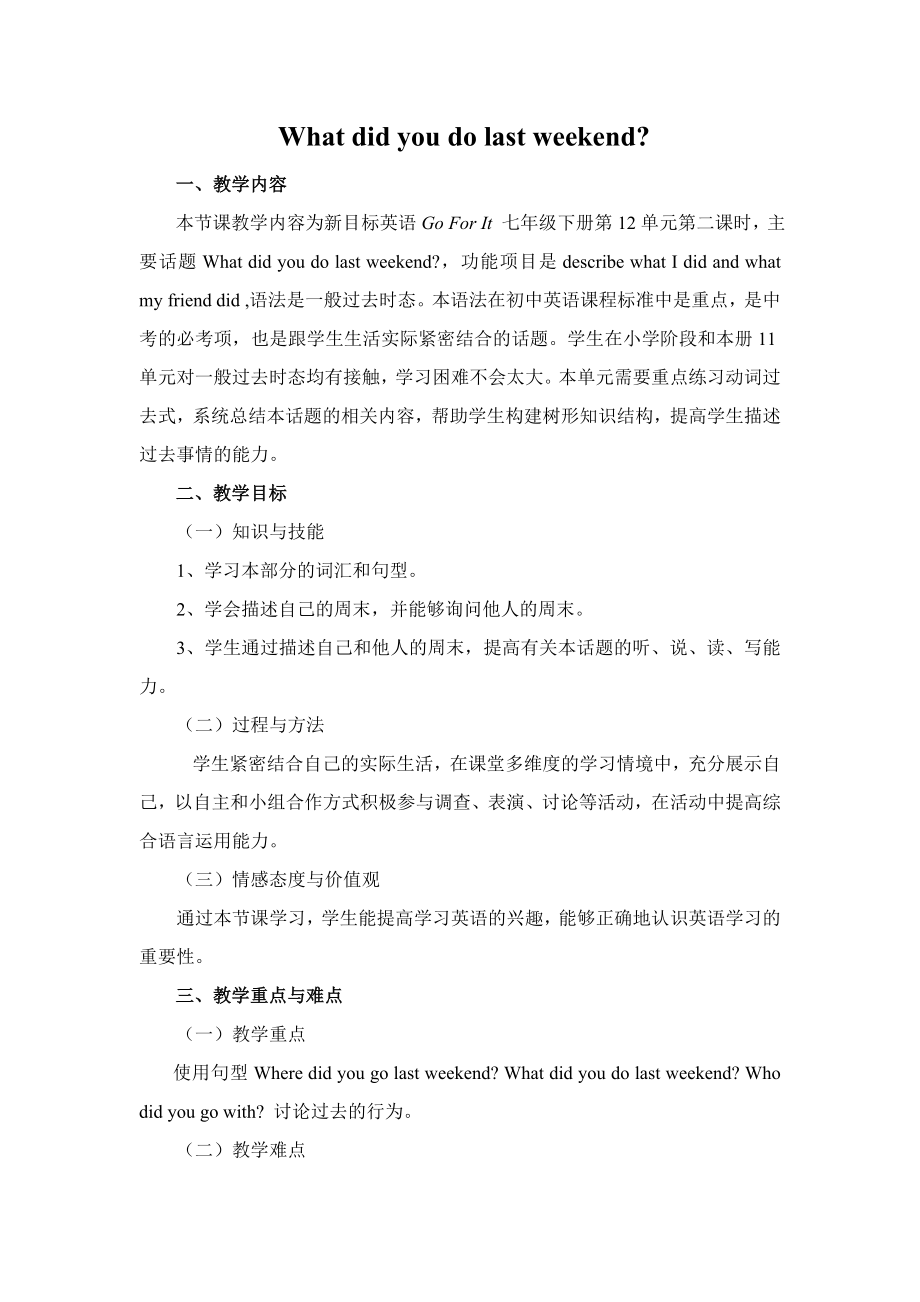《人教版英語(yǔ)七年級(jí)下冊(cè)Unit 12 What did you do last weekend_ Section A 2d—3c表格式教案》由會(huì)員分享����,可在線閱讀,更多相關(guān)《人教版英語(yǔ)七年級(jí)下冊(cè)Unit 12 What did you do last weekend_ Section A 2d—3c表格式教案(4頁(yè)珍藏版)》請(qǐng)?jiān)谘b配圖網(wǎng)上搜索��。
1�、 What did you do last weekend?
一、教學(xué)內(nèi)容
本節(jié)課教學(xué)內(nèi)容為新目標(biāo)英語(yǔ)Go For It 七年級(jí)下冊(cè)第12單元第二課時(shí)���,主要話題What did you do last weekend?�,功能項(xiàng)目是describe what I did and what my friend did ,語(yǔ)法是一般過(guò)去時(shí)態(tài)��。本語(yǔ)法在初中英語(yǔ)課程標(biāo)準(zhǔn)中是重點(diǎn)����,是中考的必考項(xiàng),也是跟學(xué)生生活實(shí)際緊密結(jié)合的話題����。學(xué)生在小學(xué)階段和本冊(cè)11單元對(duì)一般過(guò)去時(shí)態(tài)均有接觸,學(xué)習(xí)困難不會(huì)太大��。本單元需要重點(diǎn)練習(xí)動(dòng)詞過(guò)去式�����,系統(tǒng)總結(jié)本話題的相關(guān)內(nèi)容���,幫助學(xué)生構(gòu)建樹(shù)形知
2�����、識(shí)結(jié)構(gòu)���,提高學(xué)生描述過(guò)去事情的能力。
二����、教學(xué)目標(biāo)
(一)知識(shí)與技能
1、學(xué)習(xí)本部分的詞匯和句型�。
2、學(xué)會(huì)描述自己的周末�,并能夠詢(xún)問(wèn)他人的周末。
3�、學(xué)生通過(guò)描述自己和他人的周末,提高有關(guān)本話題的聽(tīng)����、說(shuō)�、讀����、寫(xiě)能力。
(二)過(guò)程與方法
學(xué)生緊密結(jié)合自己的實(shí)際生活����,在課堂多維度的學(xué)習(xí)情境中,充分展示自己�����,以自主和小組合作方式積極參與調(diào)查����、表演、討論等活動(dòng)�,在活動(dòng)中提高綜合語(yǔ)言運(yùn)用能力。
(三)情感態(tài)度與價(jià)值觀
通過(guò)本節(jié)課學(xué)習(xí)����,學(xué)生能提高學(xué)習(xí)英語(yǔ)的興趣,能夠正確地認(rèn)識(shí)英語(yǔ)學(xué)習(xí)的重要性���。
三��、教學(xué)重點(diǎn)與難點(diǎn)
(一)教學(xué)重點(diǎn)
使用句型Where did you go last
3���、 weekend? What did you do last weekend? Who did you go with? 討論過(guò)去的行為。
(二)教學(xué)難點(diǎn)
動(dòng)詞過(guò)去式�����。
四���、教學(xué)準(zhǔn)備
制作多媒體課件�,組建學(xué)習(xí)小組�。
五、課時(shí)安排
1課時(shí)�����。
六�����、教學(xué)過(guò)程
教學(xué)步驟
教師活動(dòng)
學(xué)生活動(dòng)
設(shè)計(jì)意圖
Step One
Warming up
1. Greet the class, and introduce myself.
2. Show some pictures to the students. Have them guess :Wher
4����、e did I go?
Who did I go with?
What did I do?
1. Greet the teacher .
2. Guess :
Did you go to the mountains?
Did you go with your son?
Did you climb the mountains?
情境導(dǎo)入���,利用老師本人照片,既滿足了學(xué)生對(duì)新老師的好奇心�,又引出了本課的重點(diǎn)句型。激勵(lì)引領(lǐng)學(xué)生主動(dòng)參與課堂活動(dòng)��。
Step Two
Preparation
5����、
1. Organize the students to make a survey in groups of 4. The survey is about what they did last weekend. Walk around the classroom to help the students.
2. Give 3 chances to report something about their own group. Listen to the reports and correct the mistakes.
1.Students ask and answer in
6、groups to finish the table���,then prepare the report.
2.Three students give their reports and other students listen and find out the mistakes.
小組內(nèi)互問(wèn)互答完成調(diào)查表格���,通過(guò)搶答的形式作報(bào)告,調(diào)動(dòng)學(xué)生積極性��,活躍課堂氣氛���。
3.Show the pictures of Lisa and Paul.
T: What about Lisa’s and Paul’s weekend?
3.Look at the
7�、pictures and get ready for the next listening.
對(duì)聽(tīng)力材料中的人物進(jìn)行介紹���,為聽(tīng)力做好準(zhǔn)備����。
Step Three:
Listening
Task 1
1.Show the conversation of 2d with 7 blanks on the screen. Play the tape , have students find out the right words to fill in the blanks.
2.Check the answers.
3.Learn the new words and phra
8、ses.
1.Listen to the tape, choose the right words to fill in the blanks.
2.Students volunteer to answer .
3.Read and remember the new words and phrases.
聽(tīng)的訓(xùn)練:7個(gè)空是本部分的新單詞及詞組�����,通過(guò)聽(tīng)音選詞��,檢查學(xué)生的預(yù)習(xí)情況,并安排下一步的詞匯學(xué)習(xí)��。
Step Three:
Listening
Task 2
9��、
1.Have students read the dialogue of 2d, find out the answers of the following questions:
How was Lisa’s last weekend ?
Where did she go?
What did she do?
What did Paul do ?
2.Play the tape again, have students listen and repeat.
3.Practice reading.
T---Students
Boys--- girls
In p
10�����、airs.
4. Role-play the conversation.
5. Organize the students to find out the phrases in groups and then write them down. Ask one student of every group to write down on the blackboard.
6.Have the students retell the conversation.
1. Read the dialogue of 2d, find out the answers.
11����、
2. Listen and repeat.
3.Practice reading.
4.Role-play.
5. Find out the phrases in groups and then write them down.
6.Fill in the blanks to retell the conversation.
通過(guò)帶著問(wèn)題讀原文�,加深對(duì)原文的理解,深化本單元的重點(diǎn)句型���。
大量反復(fù)的閱讀�,訓(xùn)練學(xué)生的說(shuō)的能力。
通過(guò)本環(huán)節(jié)�,學(xué)生清楚地知道本節(jié)課的重點(diǎn)詞匯短語(yǔ)。
重
12�����、點(diǎn)練習(xí)一般過(guò)去時(shí)態(tài)����。
Step Four:
Preparation
1.The teacher tell the joke of 3b .
2.Ask the students to fill in the blanks.
Check the answers.
3.Have the students work in groups to find out the phrases and sentences. Write down on the learning plan.
1.Listen and guess what the te
13、acher is saying.
2.Complete the passage with the correct forms of the words in the box.
3. Work in groups to find out the phrases and sentences. Write them down.
通過(guò)老師的豐富的表情和生動(dòng)的肢體語(yǔ)言讓學(xué)生理解3b,并為下一步學(xué)生表演做了示范��。
Step Five:
Acting
1.Give the students some minutes to prepare acting.
The teac
14����、her walks around to give some help.
2.Give 2 chances to show .
1. Work in a group of 4 to act.
2.Volunteer to act.
通過(guò)對(duì)文章的改編,提高學(xué)生學(xué)英語(yǔ)的興趣��;通過(guò)給學(xué)生舞臺(tái)表演�,讓學(xué)生體驗(yàn)學(xué)英語(yǔ)的樂(lè)趣。
Step Six
Test
Have students do some exercises to test if they master the importance of this lesson.
Do exercises .
通過(guò)測(cè)試檢測(cè)學(xué)生本節(jié)課學(xué)習(xí)情況�。
七、板書(shū)設(shè)計(jì)
Unit 12What did you do last weekend?
Where did you go last weekend?
Who did you go with?
What did you do ?
八、課后作業(yè)
Write a short composition to tell us your last weekend and your friend’s.
 人教版英語(yǔ)七年級(jí)下冊(cè)Unit 12 What did you do last weekend_ Section A 2d—3c表格式教案
人教版英語(yǔ)七年級(jí)下冊(cè)Unit 12 What did you do last weekend_ Section A 2d—3c表格式教案

